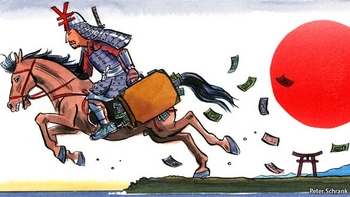海外企業を買いあさる日本企業 [経済]
強い円を武器にして、海外市場に殴り込みをかける日本企業

★2011年度は、サンリオ、ユニクロ、キリンホールデイングス、武田薬品、東芝、ソニーなどの日本企業が積極的に海外市場の買収を行った。2011年度に日本企業全体が行った海外企業買収額は過去最多の800億ドルに達したと、イギリスの経済誌エコノミスト(12月17日号)で報じている。
エコノミストは、日本企業がなぜ、国内ではなくて、海外企業の買収に目を向けるようになったのか、その経済的な背景に迫ります。
日本企業による海外企業の買収は、実は1980年代には盛んに行われていたが、今回のはそれとは日本の経済的状況が大きく異なっていると指摘している。
When Japan Inc went shopping abroad in the 1980s, it was a sign of strength. Japanese companies were spreading their wings because they were growing. This time, it is a symptom of weakness.
「1980年代に日本企業が海外企業の買収に出た時は、日本経済の強さを表していて、日本企業が成長していたために羽を広げていたのだ。だが今回の日本企業による一連の海外企業の買収は日本経済の弱さの兆候なのだ。」
★日本経済はなぜ衰退しているのかーその原因は?
The Japanese population is ageing and shrinking. The economy is sluggish. Consumption is lacklustre. So Japanese firms find it nearly impossible to expand domestically.
「日本の人口は高齢化しており、減少している。経済は低迷し、個人消費には活気が見られない。そのため、日本企業は、国内での事業拡大はほとんど無理だと見ているのである。」
★これからは国内よりも海外市場だ
thanks to crises elsewhere in the rich world, the yen is extraordinarily strong. It has appreciated by 45% against the dollar in the past four years. And having learned thrift during their own banking crisis a decade ago, Japanese firms are flush: big listed companies are sitting on a cash pile of ¥60 trillion.
「先進国での経済危機のせいで、円が異常に高くなっている。過去4年間で45%も高くなってしまった。そして10年前の日本の銀行危機の時に倹約を学んでいるので、日本の企業には運転資金が豊富に残っており、大手上場企業は60兆円という現金の山の上にあぐらをかいているのである。」
★これだけの資金力がありながら、国内ではそれを活用する場がほとんどないため、日本企業が海外企業ー特に急成長している新興国の企業ーの買収に走ったとしても何の不思議もない。
★日本経済のグローバル化は避けられない時代の流れだ
The foreign shopping spree is internationalising Japanese industry by the back door. Japan Inc is acting like a massive sovereign-wealth fund, placing its money abroad to earn investment income at home (and help Japan maintain a current-account surplus).
「外国企業の買収が日本産業を裏側から国際的な産業にしている。日本企業は巨大な政府系ファンドのように外国企業買収を行い、国内の投資収益を稼ぐだめに資金を海外で運用しているのだ。
★高齢者と若者の連帯によって日本経済が活性化
When old people retire, they tend to live off their savings. They supply capital to younger, sprightlier, cash-strapped folk, who put it to work and pay dividends or interest to the retirees. That is, roughly speaking, what Asia’s ageing archipelago is starting to do.
「高齢者は退職後は、蓄えた貯蓄で生計を立てようとする。高齢者は、若く元気がよくてお金に困っている人に資金を提供する。そして若者たちはその資金を仕事に活用して、退職者たちに配当金や利子を支払っているのだ。以上が、大ざっぱに言って、人口の高齢化が進んいる日本列島がやり始めたことなのだ。」
「ワンポイント英語講座」
Why Japan Inc has been going on a foreign spree「日本企業はなぜ外国企業を買いあさるのか」
この見出しの文に使われているgo on a spreeは一般的には「飲み騒ぐ、どんちゃん騒ぎをする、浮かれ騒ぐ、羽目をはずして騒ぐ」という意味のイディオムですが、spreeにの前にshoppingを付けて、go on a shopping spreesとなると「派手に買い物をしに出掛ける」という意味になります。
日本企業が海外市場に派手に買い物(企業買収)に出かける様子を表している文と言えます。
※このshopping spreeという表現は、最近の米誌Time(12月12日号)のある記事に使われていました。
India's Online Shopping Spreeという見出しで、インドでのインターネット商取引がインターネット利用者が急増するにつれて、これから飛躍的に伸びていくという記事です。
Japanese firms shop abroad
Armed with a strong yen
Why Japan Inc has been going on a foreign spree
Dec 17th 2011 | TOKYO | from the print edition
MR TICKLE and Mr Bump are leaping into bed with Hello Kitty. Sanrio, the owner of the bow-adorned feline, said on December 6th that it had acquired the “Mr Men” franchise from Chorion of Britain. The deal, for an estimated ¥3 billion ($40m), brings the Japanese design and licensing firm 86 playful characters who have delighted toddlers in 30 countries and shifted 100m books.
Corporate Japan is on an overseas shopping spree. Japanese firms spent a record $80 billion on some 620 foreign companies in 2011, according to Dealogic, a firm that measures such things (see chart), exceeding the previous record of 466 deals worth $75 billion in 2008. When Japan Inc went shopping abroad in the 1980s, it was a sign of strength. Japanese companies were spreading their wings because they were growing. This time, it is a symptom of weakness.
The past year in Japan has been wretched. An earthquake and tsunami in March wrecked factories and disrupted supply chains, creating shortages of all sorts of crucial components. Radiation fears hurt exports. A strong yen walloped profits. Floods in Thailand interrupted the distribution of electronics and car parts. Corporate-governance scandals cast a black cloud over blue suits nationwide.
The Japanese population is ageing and shrinking. The economy is sluggish. Consumption is lacklustre. So Japanese firms find it nearly impossible to expand domestically. At the same time, thanks to crises elsewhere in the rich world, the yen is extraordinarily strong. It has appreciated by 45% against the dollar in the past four years. And having learned thrift during their own banking crisis a decade ago, Japanese firms are flush: big listed companies are sitting on a cash pile of ¥60 trillion.
With all this buying power and few opportunities at home, it is hardly surprising that Japanese firms are snapping up foreign companies, especially in fast-growing emerging economies. “Unless we grow we’re not able to stay alive simply by staying in Japan,” explains Tadashi Yanai, the boss of Uniqlo’s Fast Retailing, a big clothing firm. The time is ripe for foreign deals, he chirps. The economic crises in America and Europe have pummelled share prices, making companies cheaper to acquire.
Back in the 1980s Japanese firms hunted trophies such as golf courses and film studios. Now they are taking a more pragmatic approach, buying solid firms in fast-growing markets and filling gaps in their product lines.
For example, Kirin, a big Japanese brewer, is acquiring a majority stake in Schincariol, a Brazilian one, for $2.6 billion. The Japanese beer market is flat; Brazil’s is growing by 10% a year. The biggest deal of the year was when Takeda, a Japanese drug firm, bought Nycomed, a Swiss one, for ¥1 trillion. Almost 40% of Nycomed’s sales are in emerging markets.
Japanese trading houses are hungrily buying energy projects, especially those involving shale gas. This year they spent $10 billion, up from less than $3 billion in 2010. The pace of such deals accelerated after Japanese nuclear-power plants were suspended following the nuclear accident at Fukushima in March, which made many Japanese worry about their energy supply. Toshiba spent $1.6 billion on Landis+Gyr, which makes “smart” electricity meters for homes. Sony paid $8.4 billion for control of its cellphone venture, Sony Ericsson, a stake in the record label EMI and other stuff.
This time really is different
In the past, Japanese firms would parachute in bosses from Tokyo to run the show. Many were monocultural and mediocre. Now, Japanese firms wisely rely on local talent. Many of the new generation of Japanese executives have lived and worked abroad, notes Shinsuke Tsunoda, the head of mergers and acquisitions in Japan at Nomura, a Japanese securities house. This means they are more comfortable doing deals with foreigners, and they are better at integrating the foreign firms they buy with their new Japanese owners.
The foreign shopping spree is internationalising Japanese industry by the back door. Japan Inc is acting like a massive sovereign-wealth fund, placing its money abroad to earn investment income at home (and help Japan maintain a current-account surplus).
When old people retire, they tend to live off their savings. They supply capital to younger, sprightlier, cash-strapped folk, who put it to work and pay dividends or interest to the retirees. That is, roughly speaking, what Asia’s ageing archipelago is starting to do.
(Economist 2011/12/17)
タグ:企業買収




コメント 0